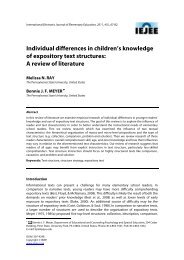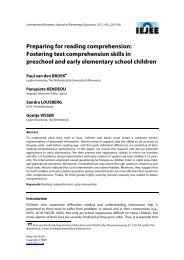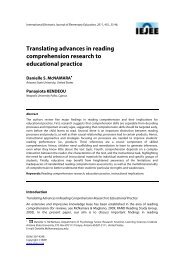The effects of syntactic and lexical complexity on the comprehension ...
The effects of syntactic and lexical complexity on the comprehension ...
The effects of syntactic and lexical complexity on the comprehension ...
Create successful ePaper yourself
Turn your PDF publications into a flip-book with our unique Google optimized e-Paper software.
<str<strong>on</strong>g>The</str<strong>on</strong>g> Effects <str<strong>on</strong>g>of</str<strong>on</strong>g> Syntactic <str<strong>on</strong>g>and</str<strong>on</strong>g> Lexical / Arya, Hiebert & Pears<strong>on</strong>correctly identify its meaning. Fur<strong>the</strong>r, essential, a word with a comparable SFI value tobacteria (SFI=56) was a much less familiar word, at least for our sample <str<strong>on</strong>g>of</str<strong>on</strong>g> students, in thatless than half (42%) <str<strong>on</strong>g>of</str<strong>on</strong>g> <strong>the</strong> students were able to correctly identify its meaning. Assumingthat world <str<strong>on</strong>g>and</str<strong>on</strong>g> word knowledge is shaped by experience, it is plausible to assume that mosteight year olds (<strong>the</strong> average age <str<strong>on</strong>g>of</str<strong>on</strong>g> our sample) have visited <strong>the</strong> dentist several times <str<strong>on</strong>g>and</str<strong>on</strong>g>have learned about dental hygiene, including words such as bacteria. <str<strong>on</strong>g>The</str<strong>on</strong>g> role <str<strong>on</strong>g>of</str<strong>on</strong>g> c<strong>on</strong>ceptualfamiliarity as a predictor <str<strong>on</strong>g>of</str<strong>on</strong>g> text comprehensi<strong>on</strong> has been commented up<strong>on</strong> in previousresearch (Cunningham & Stanovich, 1998; Kintsch, 1998; Smagorinsky, 2001; Snow & Sweet,2003; Stahl, 1999), thus giving strength to this admittedly speculative explanati<strong>on</strong> for <strong>the</strong>interacti<strong>on</strong> between topic familiarity <str<strong>on</strong>g>and</str<strong>on</strong>g> <str<strong>on</strong>g>lexical</str<strong>on</strong>g> <str<strong>on</strong>g>complexity</str<strong>on</strong>g>. However, it is important to notethat our explanati<strong>on</strong> <str<strong>on</strong>g>of</str<strong>on</strong>g> <strong>the</strong> inc<strong>on</strong>sistent <str<strong>on</strong>g>lexical</str<strong>on</strong>g> <str<strong>on</strong>g>complexity</str<strong>on</strong>g> effect are tentative at best <str<strong>on</strong>g>and</str<strong>on</strong>g>require fur<strong>the</strong>r investigati<strong>on</strong>. Future studies <strong>on</strong> <strong>the</strong> <str<strong>on</strong>g>effects</str<strong>on</strong>g> <str<strong>on</strong>g>of</str<strong>on</strong>g> <str<strong>on</strong>g>lexical</str<strong>on</strong>g> <str<strong>on</strong>g>complexity</str<strong>on</strong>g> shouldinclude measures <str<strong>on</strong>g>of</str<strong>on</strong>g> students’ prior knowledge in order to assess c<strong>on</strong>ceptual familiarityadequately.A specific interest in <strong>the</strong> present study was <strong>the</strong> effect <str<strong>on</strong>g>of</str<strong>on</strong>g> variati<strong>on</strong>s in text <str<strong>on</strong>g>complexity</str<strong>on</strong>g> <strong>on</strong><strong>the</strong> comprehensi<strong>on</strong> <str<strong>on</strong>g>of</str<strong>on</strong>g> ELLs. Language status did not explain any additi<strong>on</strong>al variance inperformance bey<strong>on</strong>d <strong>the</strong> general findings in this study. Thus, <str<strong>on</strong>g>lexical</str<strong>on</strong>g> <str<strong>on</strong>g>complexity</str<strong>on</strong>g> was <strong>the</strong> <strong>on</strong>lysignificant factor in comprehensi<strong>on</strong> performance for ELLs. This finding is c<strong>on</strong>sistent withresearch by Proctor, August, Carlo <str<strong>on</strong>g>and</str<strong>on</strong>g> Snow (2005) who reported that L2 vocabularyknowledge was a significant predictor <str<strong>on</strong>g>of</str<strong>on</strong>g> L2 text comprehensi<strong>on</strong> <str<strong>on</strong>g>of</str<strong>on</strong>g> ELLs. Our findings did notreveal any significant differences in comprehensi<strong>on</strong> performance between native Englishspeakers <str<strong>on</strong>g>and</str<strong>on</strong>g> ELLs, thus suggesting a global model <str<strong>on</strong>g>of</str<strong>on</strong>g> comprehensi<strong>on</strong>, seemingly c<strong>on</strong>trary toProctor et al.’s (2005) c<strong>on</strong>clusi<strong>on</strong> that we need an L2-<strong>on</strong>ly model <str<strong>on</strong>g>of</str<strong>on</strong>g> comprehensi<strong>on</strong>.However, due to differences in specific informati<strong>on</strong> about L1 pr<str<strong>on</strong>g>of</str<strong>on</strong>g>iciency, comparis<strong>on</strong>sbetween this study <str<strong>on</strong>g>and</str<strong>on</strong>g> <strong>the</strong> work by Proctor et al. are speculative at best.While <strong>the</strong> results <str<strong>on</strong>g>of</str<strong>on</strong>g> this study are intriguing, it is important to note significant limitati<strong>on</strong>s.First, <strong>the</strong> manipulated porti<strong>on</strong>s <str<strong>on</strong>g>of</str<strong>on</strong>g> <strong>the</strong> experimental texts (approximately 100 words in each<str<strong>on</strong>g>of</str<strong>on</strong>g> <strong>the</strong> 200-word texts) may not have been l<strong>on</strong>g enough to allow for <strong>the</strong> detecti<strong>on</strong> <strong>the</strong> <str<strong>on</strong>g>effects</str<strong>on</strong>g><str<strong>on</strong>g>of</str<strong>on</strong>g> <str<strong>on</strong>g>syntactic</str<strong>on</strong>g> <str<strong>on</strong>g>and</str<strong>on</strong>g> <str<strong>on</strong>g>lexical</str<strong>on</strong>g> <str<strong>on</strong>g>complexity</str<strong>on</strong>g> across all four topics. Additi<strong>on</strong>ally, <strong>the</strong> fact that ELL statuswas dichotomously classified (ELL or n<strong>on</strong>-ELL) could limit our ability to explore <strong>the</strong> effect <str<strong>on</strong>g>of</str<strong>on</strong>g>first language (L1) expertise <strong>on</strong> performance. A multitude <str<strong>on</strong>g>of</str<strong>on</strong>g> studies highlight <strong>the</strong> significant<str<strong>on</strong>g>effects</str<strong>on</strong>g> <str<strong>on</strong>g>of</str<strong>on</strong>g> L1 pr<str<strong>on</strong>g>of</str<strong>on</strong>g>iciency <strong>on</strong> L2 acquisiti<strong>on</strong> <str<strong>on</strong>g>and</str<strong>on</strong>g> comprehensi<strong>on</strong> (Jimenez, Garcia, & Pears<strong>on</strong>,1996; Proctor et al., 2005). <str<strong>on</strong>g>The</str<strong>on</strong>g> hypo<strong>the</strong>sis that students’ comm<str<strong>on</strong>g>and</str<strong>on</strong>g> over <strong>the</strong>ir first languageinfluences <strong>the</strong>ir ability to comprehend both <str<strong>on</strong>g>syntactic</str<strong>on</strong>g>ally <str<strong>on</strong>g>and</str<strong>on</strong>g> <str<strong>on</strong>g>lexical</str<strong>on</strong>g>ly complex features <str<strong>on</strong>g>of</str<strong>on</strong>g>texts was not c<strong>on</strong>sidered in <strong>the</strong> present study. Fur<strong>the</strong>r research is needed to determinepossible <str<strong>on</strong>g>effects</str<strong>on</strong>g> <str<strong>on</strong>g>of</str<strong>on</strong>g> varying gradati<strong>on</strong>s in L1 pr<str<strong>on</strong>g>of</str<strong>on</strong>g>iciency <strong>on</strong> L2 text difficulty.<str<strong>on</strong>g>The</str<strong>on</strong>g> findings within <strong>the</strong> present study have left questi<strong>on</strong>s regarding text accessibilityunanswered. Does <str<strong>on</strong>g>syntactic</str<strong>on</strong>g> <str<strong>on</strong>g>complexity</str<strong>on</strong>g> have absolutely no effect <strong>on</strong> comprehensi<strong>on</strong>, or is<strong>the</strong>re some gradati<strong>on</strong> <str<strong>on</strong>g>of</str<strong>on</strong>g> difference that was not captured within <strong>the</strong> design <str<strong>on</strong>g>of</str<strong>on</strong>g> our texts?Does prior knowledge, as defined by c<strong>on</strong>ceptual familiarity, trump <str<strong>on</strong>g>lexical</str<strong>on</strong>g> <str<strong>on</strong>g>complexity</str<strong>on</strong>g>, asindexed by frequency, in determining comprehensi<strong>on</strong>? If so, how much familiarity isnecessary to overcome difficult vocabulary? Finally, do EL learners face <strong>the</strong> same difficultiesas native English speakers in terms <str<strong>on</strong>g>of</str<strong>on</strong>g> text accessibility, even when c<strong>on</strong>sidering <strong>the</strong> effect <str<strong>on</strong>g>of</str<strong>on</strong>g>gradati<strong>on</strong>s in L1 pr<str<strong>on</strong>g>of</str<strong>on</strong>g>iciency? We hope that future studies will shed fur<strong>the</strong>r light <strong>on</strong> <strong>the</strong>seimportant questi<strong>on</strong>s. At <strong>the</strong> same time, our failure to elicit a <str<strong>on</strong>g>syntactic</str<strong>on</strong>g> <str<strong>on</strong>g>complexity</str<strong>on</strong>g> affectmight give us pause, when we design curriculum, <str<strong>on</strong>g>of</str<strong>on</strong>g> being too rigid about keeping sentencelength to an absolute minimum. Fur<strong>the</strong>r, <strong>the</strong> <str<strong>on</strong>g>lexical</str<strong>on</strong>g> <str<strong>on</strong>g>complexity</str<strong>on</strong>g> effect, which seemed to bemost powerful in situati<strong>on</strong>s in which students could not rely <strong>on</strong> prior knowledge from121





